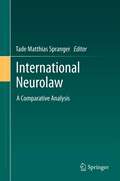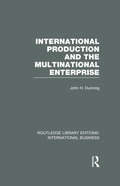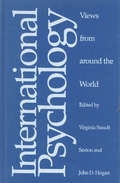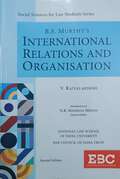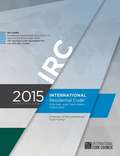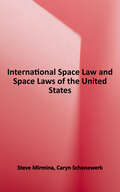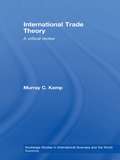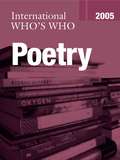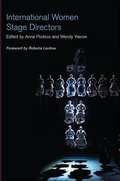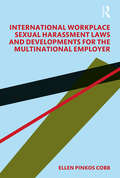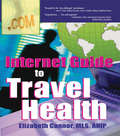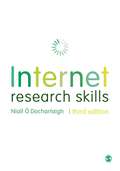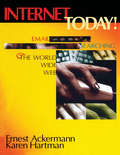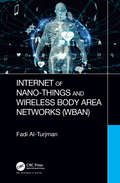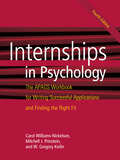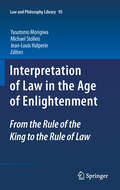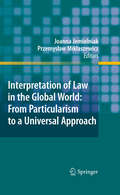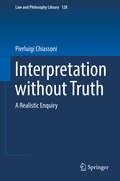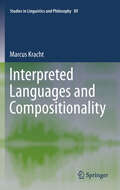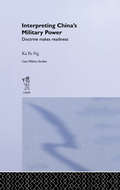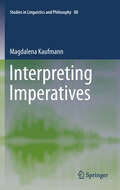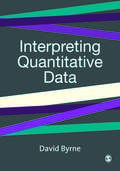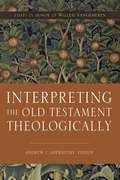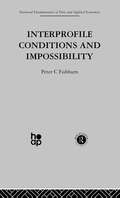- Table View
- List View
International Neurolaw
by Tade Matthias SprangerWhereas the past few years have repeatedly been referred to as the "era of biotechnology", most recently the impression has emerged that at least the same degree of attention is being paid to the latest developments in the field of neurosciences. It has now become nearly impossible to maintain an overview of the number of research projects dealing with the functionality of the brain - for example concerning its organizational structure - or projects dealing with the topics of legal responsibility, brain-computer interface applications, neuromarketing, lie detection or mind reading. These procedures are connected to a number of legal questions concerning the framework conditions of research projects as well as the right approach to the findings generated. Given the primary importance of the topic for the latest developments, it is essential to compare the different legal systems and strategies that they offer for dealing with these legal implications. Therefore, the book International Neurolaw - A Comparative Analysis contains several country reports from around the world, as well as those of international organizations such as UNESCO, in order to show the different legal approaches to the topic and possible interactions.
International Production and the Multinational Enterprise: International Business: International Production And The Multinational Enterprise (rle International Business) (Routledge Library Editions: International Business)
by John H DunningThe growth and impact of the multinational enterprise (MNE) in the post war period is one of the most important phenomena of our time. This volume, originally published in 1981 provides a comprehensive and detailed review of both the theoretical and policy issues at a time when the subject had reached a watershed, after the controversies of the 1970s. The book provides a balanced discussion of major themes such as the development of modern theories of international production; the impact of the MNE on the nation-state and the structure of the international market; the response of governments and the appropriate framework for policy measures; and the historical context and likely future of the MNE.
International Psychology: Views from around the World
by John D. Hogan Virginia Staudt SextonWhile acknowledging their major debt to Europeans like Freud, Piaget, Erickson, Lewin, and Jung, American psychologists generally concentrated on developments in American psychology. And this tendency prevails in spite of the fact that innovations—in sport psychology and clinical neuropsychology, for example—have continued to come from abroad. International Psychology is a much-needed exposition of the state of psychology in forty-five countries, including the Soviet Union and the United States. Emphasizing the period from 1960 to the present, and surveying the training, research, and practice of psychologists on six continents, this volume introduces a widely dispersed network of occupational kinfolk, many of whom have scant knowledge of one another. The editors provide a panoramic view in the opening chapter, as well as an epilogue and name and subject indexes. The contributors, nearly all distinguished psychologists in their countries, represent Argentina, Armenia, Australia, Austria, Belgium, Brazil, Canada, Colombia, Cuba, Czechoslovakia, the Dominican Republic, Egypt, Finland, France, the German Democratic Republic, Germany, Greece, Hong Kong, Hungary, India, Iran, Ireland, Israel, Italy, Japan, Korea, Mexico, the Netherlands, New Zealand, Norway, Pakistan, Philippines, Poland, Romania, South Africa, Spain, Switzerland, Turkey, the Soviet Union, the United Kingdom, the United States, Uruguay, Venezuela, Yugoslavia, and Zimbabwe.
International Relations 1914 to 1973 - Madurai Kamaraj University
by Directorate of distance educationThe field of International Relations focuses on the complex interactions between states across the globe. With the world becoming increasingly interconnected and interdependent, socio-economic issues have gained paramount importance for the survival and well-being of humanity. Consequently, the study of International Relations has evolved to encompass deeper dimensions. As noted by E.H. Carr, a profound understanding of contemporary international affairs is now indispensable for any discerning individual. Therefore, it is imperative to emphasize that postgraduate students in this field must possess a comprehensive understanding of international politics to navigate the intricate dynamics shaping our world today.
International Relations and Organisation: Social Sciences For Law Students Series
by Prof. B. S. Murthy Dr V. RajyalakshmiThe book International Relations and Organisation by Prof. B. S. Murthy, revised by Dr. V. Rajyalakshmi, is designed for law students as an introduction to the fundamental concepts of international relations and organizations. It covers topics such as the historical evolution of the world community, the role of states, non-state actors, and international organizations in global governance. The book explores various instruments of state policy, including diplomacy, ideology, economics, and military power, and addresses issues like conflict resolution, war avoidance, and peaceful change. Special attention is given to the United Nations and regional organizations in maintaining global order, making it a key resource for understanding the interconnected nature of law, politics, and international cooperation.
International Residential Code For One- and Two-Family Dwellings
by International Code Council StaffThis comprehensive code for homebuilding combines building, plumbing, mechanical, fuel gas, energy, and electrical provisions into a single resource. The 2015 INTERNATIONAL RESIDENTIAL CODE FOR ONE- AND TWO- FAMILY DWELLINGS LOOSE LEAF uses these provisions to provide detailed insight into the construction of one- and two-family dwellings and townhouses up to three stories high. Using foundational principles that facilitate the use of new materials and building designs to guide the content, this reference guide also establishes minimum regulations using prescriptive provisions. This updated code includes information on common walls separating townhouses, remodeling of an existing basement, ramps that do not serve the required egress door, and carbon monoxide alarms.
International Space Law and Space Laws of the United States
by Steve Mirmina Caryn SchenewerkThis book provides helpful practice tips for representing clients and doing business in today's commercial space industry, as well as important coverage of the essentials for students of Space Law. Each chapter explores a nuanced space law issue and concludes with review questions. Written by two Georgetown Space Law professors who are also Space Law practitioners with more than 50 years of combined expertise having worked as legal counsel for NASA, in the halls of Congress, and in the Executive Branch, this book explains complex regulations in approachable language and is thoroughly annotated. This work is valuable for students of Space Law as well as practitioners. It will serve as a handy desk reference for years to come.
International Trade Theory: A Critical Review
by Murray KempMurray C. Kemp is one of Australia's foremost economists. He has held positions across the world including London School of Economics, U.C. Berkeley, Columbia University, McGill University, MIT, and latterly Macquarie University. Kemp was a Member of Council for the Econometric Society and was a Distinguished Fellow of the Economics
International Who's Who in Poetry 2005
by Europa PublicationsThe 13th edition of the International Who's Who in Poetry is a unique and comprehensive guide to the leading lights and freshest talent in poetry today. Containing biographies of more than 4,000 contemporary poets world-wide, this essential reference work provides truly international coverage. In addition to the well known poets, talented up-and-coming writers are also profiled.Contents:* Each entry provides full career history and publication details* An international appendices section lists prizes and past prize-winners, organizations, magazines and publishers* A summary of poetic forms and rhyme schemes* The career profile section is supplemented by lists of Poets Laureate, Oxford University professors of poetry, poet winners of the Nobel Prize for Literature, winners of the Pulitzer Prize for American Poetry and of the King's/Queen's Gold medal and other poetry prizes.
International Women Stage Directors
by Wendy Vierow Anne FliotsosA fascinating study of women in the arts, International Women Stage Directors is a comprehensive examination of women directors in twenty-four diverse countries. Organized by country, chapters provide historical context and emphasize how social, political, religious, and economic factors have impacted women's rise in the theatre, particularly in terms of gender equity. Contributors tell the stories of their home country's pioneering women directors and profile the most influential women directors practicing today, examining their career paths, artistry, and major achievements. Contributors are Ileana Azor, Dalia Basiouny, Kate Bredeson, Mirenka Cechová, Marié-Heleen Coetzee, May Farnsworth, Anne Fliotsos, Laura Ginters, Iris Hsin-chun Tuan, Maria Ignatieva, Adam J. Ledger, Roberta Levitow, Jiangyue Li, Lliane Loots, Diana Manole, Karin Maresh, Gordon McCall, Erin B. Mee, Ursula Neuerburg-Denzer, Claire Pamment, Magda Romanska, Avra Sidiropoulou, Margaretta Swigert-Gacheru, Alessandra Vannucci, Wendy Vierow, Vessela S. Warner, and Brenda Werth.
International Workplace Sexual Harassment Laws and Developments for the Multinational Employer
by Ellen Pinkos CobbAs the #MeToo movement has become an increasingly global and significant workplace matter, a timely resource compiling must-know international workplace sexual harassment laws for the multinational employer is clearly needed. This book provides a comprehensive compilation of global sexual harassment laws, clearly necessary in this climate but not currently existing until now. It presents legislation addressing workplace sexual harassment in over 50 countries in the European Region, Asia Pacific, Americas, and the Middle East and Africa. Within each region, the laws of individual countries are set forth, as well as some cultural context and recent developments to indicate present and future trends in workplace sexual harassment regulation. Written in clear, plain English for anyone without a legal background to understand, this book is essential reading and a key resource for employment and business attorneys, global employers, managers, human resources professionals, and occupational health and safety professionals. Academics, practitioners, union members, employees, NGOs, and those in the human rights field will also benefit from this timely resource.
Internet Guide to Travel Health
by Elizabeth ConnorDiscover the best Web sites for you and your family&’s well-being while traveling! The Internet Guide to Travel Health is your one-stop resource for when you need authoritative, reliable, and up-to-date information for preventing or dealing with illness and injury while traveling in the United States and abroad. For persons traveling near or far, this useful, easy-to-consult guide identifies dependable Web sites with advice, tips, and accurate facts on health issues that can affect your travel plans. You&’ll save time and effort when researching the planning, preparation, and preventive measures necessary to stay healthy while traveling. In the Internet Guide to Travel Health, you will discover a wealth of information for maintaining your health and safety throughout your trip. This book offers you Web sites to keep you informed on the latest life-threatening situations occurring throughout the world, such as disease outbreaks, epidemics, and natural disasters. With Internet addresses for what health documents to keep with you at all times, how to find doctors and clinics at your destination, and even what to do in case of a death far from home, this informative guide helps you stay organized, even in an emergency. The Internet Guide to Travel Health provides you with reliable information on: elective and compulsory immunizations, vaccinations, and examinations safety concerns with specific modes of travel-automotive, railways, air travel, cruise ships travel recommendations and accommodations for people with disabilities, seniors, children, people with HIV, and pets specific diseases, conditions, and ailments that can affect travel or be encountered while traveling-from air rage and allergies to West Nile Virus and Yellow Fever interactive tools and real-time travel advice-driving distance calculators, air flight arrival/departure delays, and traffic reports In addition to the Web site listings, the Internet Guide to Travel Health provides numerous screen shots of key Internet resources and an understandable glossary of health- and Internet-related terms. With the myriad of health and safety risks associated with traveling both nationally and internationally, this book is essential for vacationers, business travelers, explorers, and health care professionals who want to stay informed and prepared.
Internet Research Skills
by Dr Niall O DochartaighInternet Research Skills is a clear, concise guide to effective online research for social science and humanities students. The first half of the book deals with publications online, devoting separate chapters to academic articles, books, official publications and news sources, which form the core secondary sources for social science research. The second half of the book deals with the open web, a vast and confusing realm of materials, many of which have no direct print counterpart. The third edition has been updated throughout and now includes: - coverage of cutting edge online services as well as newly developed approaches to using online materials - a new chapter on organising your research and internet research methods - additional material on the use of social networks for research. - illustrations, examples and short exercises to help you put what you learn into practice. Internet Research Skills is an invaluable guide for undergraduate students carrying out research projects and for postgraduate students working on theses and dissertations.
Internet Today!
by Karen Hartman Ernest AckermannInternet Today! is, as the name implies, a survey of the components and facilities of the Internet; it is also a guide to its use, including a discussion of some features of the Internet, followed by exercises designed to create competence in both understanding and implementing the features. Chapters include: Introduction to the Internet and the World Wide Web; Using a Web Browser; The Basics of Electronic Mail and Using Netscape E-mail; Finding Information on the Web; Directories and Searching; Search Strategies for Search Engines; Writing Your Own Web Pages; Telnet, FTP, and Gopher; Legal Issues, Ethical Issues, Privacy and Security.
Internet of Nano-Things and Wireless Body Area Networks (WBAN)
by Fadi Al-TurjmanThe Internet of Nano-Things (IoNT) is a system of nano-connected devices, objects, or organisms that have unique identifiers to transfer data over a computer or cellular network wirelessly to the Cloud. Data delivery, caching, and energy consumption are among the most significant topics in the IoNT nowadays. The book addresses data routing and energy consumption challenges and proposes nano-sensing platforms in critical Wireless Body Area Networks (WBAN). This book covers both design and implementation aspects of data delivery models and strategies in a smart application enabled by the WBAN. It focuses on smart data delivery approaches and energy savings aspects in a reliable IoNT systems.
Internships in Psychology: The APAGS Workbook for Writing Successful Applications and Finding the Right Fit
by Carol Williams-Nickelson PsyD Dr. Mitch Prinstein PhD Dr. W. Greg Keilin PhDThis authoritative, hands‑on book provides doctoral‑level psychology students with all the resources they need to successfully navigate the internship application process. Topics include the most common reasons why people don&’t secure a position; how many sites to apply to; rank ordering your list of programs; writing essays, cover letters, and your curriculum vitae; securing strong letters of recommendation; preparing for interviews; sending thank you notes; receiving Match results; and more. Since the third edition of this book was released, the online application process and the internship marketplace have undergone significant changes, such as the growing importance of accreditation. This fourth edition provides updated information that will help your applications stand out to your internship programs of choice. Advice is also offered to directors of clinical training so they can guide and support students during this challenging process. This resource is provided to students by the American Psychological Association of Graduate Students—the premier group committed to representing, leading, advocating, and developing resources for graduate psychology students.
Interpretation of Law in the Age of Enlightenment
by Michael Stolleis Yasutomo Morigiwa Jean-Louis HalperinA collaboration of leading historians of European law and philosophers of law and politics identifying and explaining the practice of interpretation of law in the 18th century. The goal: establishing the actual practice in the Age of Enlightenment, and explaining why this was the case. The ideology of the Age was that law, i.e., the will of the sovereign, can be explicitly and appropriately stated, thus making interpretation redundant. However, the reality was that in the 18th century, there was no one leading source of national law that would be the object of interpretation. Instead, there was a plurality of sources of law: the Roman Law, local customary law, and the royal ordinance. However, in deciding a case in a court of law, the law must speak with one voice. Hence, interpretation to unify the norms was inevitable. What was the process? What role did justification in terms of reason, the hallmark of the Enlightenment, play? These are some of the questions addressed.
Interpretation of Law in the Global World: From Particularism to a Universal Approach
by Przemyslaw Miklaszewicz Joanna JemielniakThe volume examines the impact of applying transnational rules on the repertory, methods and practice of legal interpretation. It scrutinizes how globalization processes in law - those reaching top-down (such as European law), as well as those developing bottom-up (such as the new lex mercatoria and international commercial arbitration) - influence the often highly innovative use of various methods of legal rendition. It also examines to what extent they affect supranational and domestic decision-making. Capturing the current development of universalizing tendencies in legal interpretation, the book offers both an extensive theoretical background and thorough studies on adjudicatory practice in such fields as European and constitutional law, international business law and arbitration or criminal law.
Interpretation without Truth: A Realistic Enquiry (Law and Philosophy Library #128)
by Pierluigi ChiassoniThis book engages in an analytical and realistic enquiry into legal interpretation and a selection of related matters including legal gaps, judicial fictions, judicial precedent, legal defeasibility, and legislation. Chapter 1 provides an outline of the central theoretical and methodological tenets of analytical realism. Chapter 2 presents a conceptual apparatus concerning the phenomenon of legal interpretation, which it subsequently applies to investigate the truth-in-legal-interpretation issue. Chapters 3 to 6 argue for a theory of legal interpretation - pragmatic realism - by outlining a theory of interpretive games, revisiting the debate between literalism and contextualism in contemporary philosophy of language, and underscoring the many shortcomings of the container-retrieval view and pragmatic formalism. In turn, Chapter 7, focusing on comparative legal theory, advocates an interpretation-sensitive theory of legal gaps, as opposed to purely normativist ones. Chapter 8 explores the connection between judicial reasoning and judicial fictions, casting light on the structure and purpose of fictional reasoning. Chapter 9 provides an analytical enquiry into judicial precedent, examining a variety of ideal-typical systems in terms of their normative or de iure relevance. Chapter 10 addresses defeasibility and legal indeterminacy. In closing, Chapter 11 highlights the central tenets of a realistic theory of legislation.
Interpreted Languages and Compositionality
by Marcus KrachtThis book argues that languages are composed of sets of 'signs', rather than 'strings'. This notion, first posited by de Saussure in the early 20th century, has for decades been neglected by linguists, particularly following Chomsky's heavy critiques of the 1950s. Yet since the emergence of formal semantics in the 1970s, the issue of compositionality has gained traction in the theoretical debate, becoming a selling point for linguistic theories. Yet the concept of 'compositionality' itself remains ill-defined, an issue this book addresses. Positioning compositionality as a cornerstone in linguistic theory, it argues that, contrary to widely held beliefs, there exist non-compositional languages, which shows that the concept of compositionality has empirical content. The author asserts that the existence of syntactic structure can flow from the fact that a compositional grammar cannot be delivered without prior agreement on the syntactic structure of the constituents.
Interpreting China's Military Power: Doctrine Makes Readiness (Cass Military Studies)
by Ka Po NgAlthough inter-state tensions have generally been easing after the Cold War, military power remains a dominant factor in Asian regional politics. As China, operating the world's largest army, grows stronger, there are ongoing debates over the implications for Asia's regional security. This book argues that it is imperative to look beyond the empirical observations and conventional materialist reading of Chinese military development to understand its dynamics and directions in doctrinal terms and put it in a readiness context for evaluation. Military doctrine has long been under-studied and is often treated as a subject separate from force development. But, as this study contends, this factor is necessary for interpreting the making and purposes of China's military power because it forms the intellectual foundation of military structural and hardware development. When loaded with political rhetoric, it also communicates to us the intended uses of the military power. The role of doctrine is reinforced in the context of military readiness, which defines what for and how the army is getting ready. Force development is evaluated in structural, operational and directional terms.The importance of this analytical framework based on military doctrine and readiness is demonstrated in a survey of the evolutionof Chinese military doctrine and force development. As the Chinese People's Liberation Army has continued to adjust its military structure and operation to follow the doctrinal lead, its switches between the doctines of local war and total war have seen corresponding changes to the emphasis between operational and structural readiness.
Interpreting Imperatives
by Magdalena KaufmannImperative clauses are recognized as one of the major clause types alongside those known as declarative and interrogative. Nevertheless, they are still an enigma in the study of meaning, which relies largely on either the concept of truth conditions or the concept of information growth--neither of which are easily applied to imperatives. This book puts forward a fresh perspective. It analyzes imperatives in terms of modalized propositions, and identifies an additional, presuppositional, meaning component that makes an assertive interpretation inappropriate. The author shows how these two elements can help explain the varied effects imperatives have, depending on their usage context. Imperatives have been viewed as elusive components of language because they have a range of functions that makes them difficult to unify theoretically. This fresh view of the semantics-pragmatics interface allows for a uniform semantic analysis while accounting for the pragmatic versatility of imperatives.
Interpreting Quantitative Data
by David ByrneHow do quantitative methods help us to acquire knowledge of the real world? What are the `do's' and `don'ts' of effective quantitative research? This refreshing and accessible book provides students with a novel and useful resource for doing quantitative research. It offers students a guide on how to: interpret the complex reality of the social world; achieve effective measurement; understand the use of official statistics; use social surveys; understand probability and quantitative reasoning; interpret measurements; apply linear modelling; understand simulation and neural nets; and integrate quantitative and qualitative modelling in the research process. Jargon-free and written with the needs of students in mind, the book will be required reading for students interested in using quantitative research methods.
Interpreting the Old Testament Theologically: Essays in Honor of Willem A. VanGemeren
by Andrew T. AbernethyHow should Christians read the Old Testament today? Answers to this question gravitate between two poles. On the one hand, some pay little attention to the gap between the Old Testament and today, reading the Old Testament like a devotional allegory that points the Christian directly to Jesus. On the other hand, there are folks who prioritize an Old Testament passage’s original context to such an extent that it is by no means clear if and how a given Old Testament text might bear witness to Christ and address the church.This volume is a tribute to Willem A. VanGemeren, an ecclesial scholar who operated amidst the tension between understanding texts in their original context and their theological witness to Christ and the church. The contributors in this volume share a conviction that Christians must read the Old Testament with a theological concern for how it bears witness to Christ and nourishes the church, while not undermining the basic principles of exegesis.Two questions drive these essays as they address the topic of reading the Old Testament theologically.Christology. If the Old Testament bears witness to Christ, how do we move from an Old Testament text, theme, or book to Christ?Ecclesiology. If the Old Testament is meant to nourish the church, how do scriptures originally given to Israel address the church today?The volume unfolds by first considering exegetical habits that are essential for interpreting the Old Testament theologically. Then several essays wrestle with how topics from select Old Testament books can be read theologically. Finally, it concludes by addressing several communal matters that arise when reading the Old Testament theologically.
Interprofile Conditions and Impossibility
by P. FishburnFirst Published in 2004. Routledge is an imprint of Taylor & Francis, an informa company.
